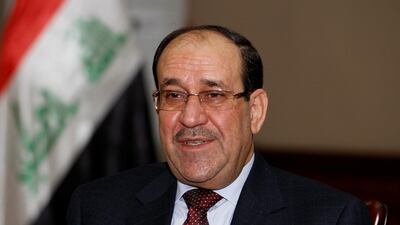Former Iraqi leader Nouri Al Maliki is attempting a comeback, four years after leaving office in disgrace, by seeking a Kurdish alliance.
The former prime minister was ousted from his position in 2014 following the fall of Mosul to ISIS. Mr Al Maliki, who is Shia, was widely criticised for alienating Sunnis and Kurds by excluding them from key positions and undermining power-sharing in Iraq. He came to power in 2006 with the blessing of both the United States and Iran.
More than three months after Iraq's general election, and as negotiations to form a coalition government continue, Mr Al Maliki is trying to strike a deal with the Kurdistan Democratic Party and the Patriotic Union of Kurdistan. It is a move that smacks of desperation, some observers say.
May's parliamentary elections saw electoral lists led by nationalist cleric Moqtada Al Sadr and Iranian-backed militia chief Hadi Al Amiri win the largest number of seats out of the 329 seat house.
Mr Al Sadr, who is leading a quartet of major parties with 136 seats, needs to secure 28 more to form a parliamentary majority.
But Kurdish parties, which collectively secured over 40 seats, have signaled their willingness to join Mr Al Maliki's State of Law bloc, which won 26 seats, along with Mr Al Amiri's Fateh bloc which won 47 seats. There is no word though on how close to an agreement the parties are.
The two proposed coalitions account for around 249 seats between them, meaning that 80 seats held by smaller parties and individuals would hold the balance of power.
Mr Al Maliki is a small player in the Iraqi parliament, with three or four seats out of his bloc who are loyal to him, said Michael Knights, a senior fellow at the Washington Institute for Near East Policy.
"However, he’s a natural politician, so he can bring people together and make deals, and this is why you talk to him," Mr Knights said, adding that he would have a limited role if Mr Al Sadr formed a government.
_______________
Read more:
Sadr and Abadi lead major coalition seeking to be next Iraq government
Iraq's Abadi pulled by competing US and Iranian forces
Iraq forms committee to investigate corruption amid ongoing unrest
Iraq completes election recount
_______________
Mr Al Maliki and the Kurds have every reason to be talking, said Andrew Parasiliti, director of global policy think tank RAND Corporation.
"The question is whether Maliki could – or would – deliver on his expansive offer to the Kurds, which, if enacted, would allow a reset in Baghdad-Erbil relations," Mr Parasailiti said
The Kurdish parties have approached negotiations in an open fashion, talking with all parties in hopes of maximising their leverage.
They seek to "develop relationships no-matter who becomes the centre of the new government in Baghdad," Mr Knights said. "It’s a smart move, even if their preference is not to work with Maliki, due to historic grievances."
Iraq's Kurds have displayed a capacity to act together to represent their interests in Baghdad, even as they compete for influence over the Kurdish north. They've also displayed a capacity for pragmatism in working with erstwhile rivals.
"They had problems with Haider Al Abadi as well, and yet they speak with him," noted Joost Hiltermann, regional programme director for conflict monitoring organisation International Crisis Group. "They don't want to lose out in government formation, and therefore will speak with anyone, and align themselves with the eventual winner."
But even courting the Kurds, Mr Al Maliki, whose only current formal role in government is as one of three largely ceremonial vice-presidents, remains a long-shot and will likely remain a supporting actor in any new government, Mr Knights said.


